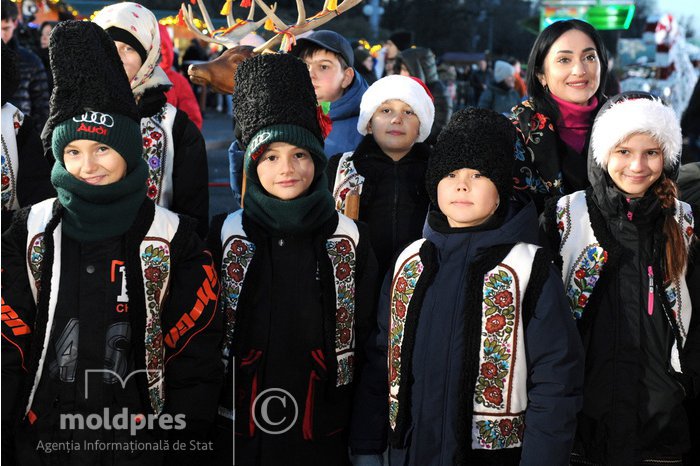
Discover Moldova with #MOLDPRES: Winter customs and traditions which turn holidays nicer and more attractive
The winter holidays are nearing. Our souls are full of joy. The winter holidays have a special place in the Moldovans’ hearts, with all kinds of popular traditions, customs, one nicer than the other. The Moldovan people have rich traditions, which give their culture a unique character. The Moldovans’ winter holidays start with Saint Andrew (13 December) and end with Saint John the Baptist (20 January).
It is about a combination of traditions and customs – some of which coming from the pre-Christian period - with Christian religious holidays. These holidays give a special magic to the cold season, bringing joy, happiness, as well as mystery and spiritual feelings. Each of us is waiting for these nice holidays with all the heart. People meet, spend the time together, sing carols and say congratulations. The winter holidays are full of special magic.
Saint Nicholas (19 December), celebrated by the Orthodox Christians, regarded as the protector of the poor people. Saint Nicholas is the one who, while turned into Santa Claus, brings presents to children.
Christmas (25 December). The Birth of God is the most important holiday of the winter, and before this holiday there is the Christmas Eve. In the morning of this day, groups of children go from home to home and sing carols, for which they receive, in exchange presents.
Christmas Tree The symbol of winter holidays is the much desired Christmas Tree. This tree existed in the Moldovan traditions much before the Christian age. The fir tree is the most important tree in the Romanian customs and it is present at the most important events in the life of a man: Baptizing, Marriage and Burial
Singing carols. A quite well-known custom is the signing of carols. The signing of carols starts on 24 December and can continue 2 or 3 days. Groups of children, adults, elderly people, only girls, only boys, young married people, etc., depending on the ethnographic area, usually participate in signing carols. The signing of carols takes place in yards of those who receive carol singers, in the home, or under the window.
The Goat. This customs lasts, as a rule, beginning with the Christmas till the New Year. The masks which were evoking Bible personages are replaced by the mask of a single animal, the name of which varies from one region to another.
The New Year (31 December — 1 January). This is practically the most expected winter holiday. Researchers see in the people’s customs, held on this period, rituals of symbolical renewing of the world, of driving away the evil spirits or of divination.
The Star. Another custom which has lost its significance during time is walking with the ‘’star’’ – old custom recorded at all Christian nations. It was meant to announce the people about the Birth of Christ.
The New Year’s Eve is the crown of the holidays, especially of the feasts – a lay holiday, full of rich feasts with special entertainments.
The Christmas (7 January, old style) People should fast for six weeks before this holiday. At the Christmas feast, people eat cakes, grape leaf rolls, meat jelly, pork sausage and drink red wine.
Saint Basil (The Old-style New Year, 14 January). According to the tradition, on the eve of Saint Basil, groups of waits, with masks on faces, go from home to home and congratulate people on the New Year and St. Basil.
The Epiphany (Baptism of the Lord, 19 January). This is a religious holiday, during which priests bless the water in churches and people take it home and sprinkle with it their households, objects, animals.
The cycle of winter holidays ends on 20 January, with the holiday of Saint John the Baptist, who baptized Lord Jesus Christ in the waters of Jordan.
Correspondent: Lilia Grubii
PHOTO Moldova strengthens image at one of biggest exhibitions in Japan
PHOTO Moldova promoted in Chinese province
PHOTO GALLERY // The Easter Holiday in Moldova. Traditions and customs
Discover Moldova with #MOLDPRES: How Moldovans celebrate Easter
PHOTO GALLERY // Spring in Moldova - rebirth and spirituality
Straseni district of Moldova among top settlements with most forest land: 600 hectares for afforestation
Blouses with embroidery displayed at anniversary exhibition at National Museum of Ethnography and Natural History of Moldova
Discovering Moldova with #MOLDPRES: Iagorlîc Reserve, true biodiversity gem on left bank of Dniester
Discover Moldova with #MOLDPRES: Lower Dniester National Park, living example of friendship between man and nature
VIDEO // Over 70 per cent of owners of lands needed for Vulcanesti-Chisinau overhead power line receive expropriation compensations
Moldovan PM says government professionalizes public administration, educates generation of young, trained, energetic, motivated leaders, to modernize, empower state
Moldova's parliament speaker in London says recognition of Moldovan driving licenses in United Kingdom close to completion
Law on 3,000 lei supplement for young employees signed by head of state
155 young people to do internships in public institutions
Moldova initiated bilateral screening with European Union on Chapter 27: Environment and Climate Change
Moldova wins four gold, two silver medals at World Mixed Martial Arts Championship
Fuels get cheaper in Moldova: energy regulator announces new prices
Energy market Operator M of Moldova designated as operator for international coupling of electricity markets
Moldovan products promoted at Moldova Presents exhibition held in Brașov
Deputy Prime Minister to pay official visit to Kazakhstan
Speaker alongside diaspora in UK at celebration of traditions
Father's Day celebrated for first time in Moldova
PM visited fruit and vegetable processing factory in Orhei
Danube Day 2025: Moldova reaffirms commitment to protecting river uniting Europe
Prime Minister visited agricultural household in Mălăiești village, Orhei district


